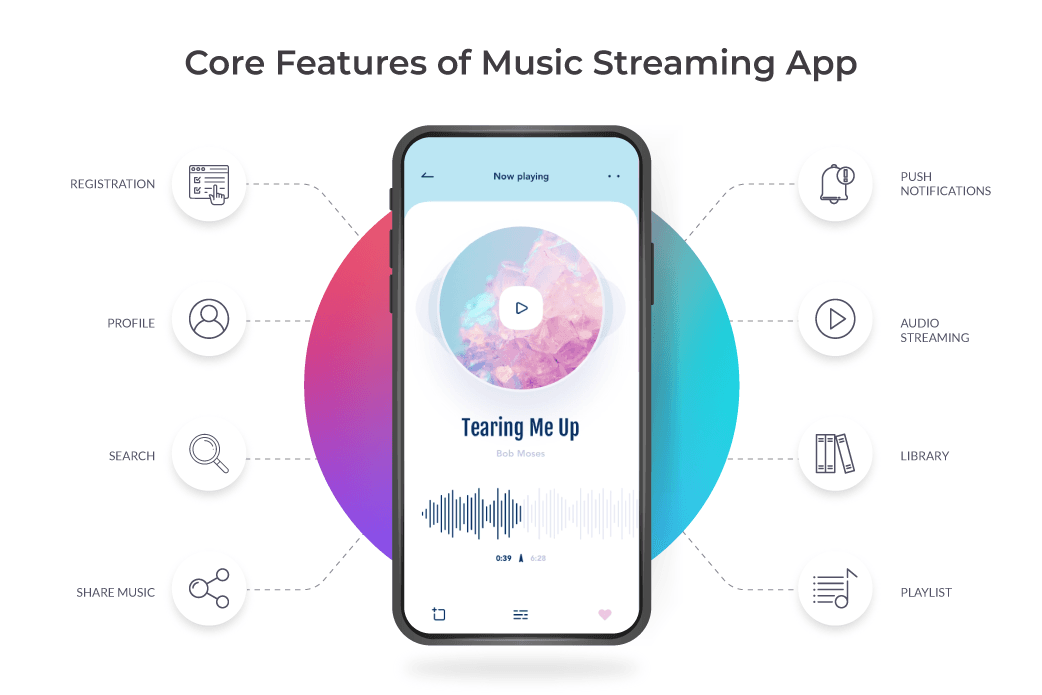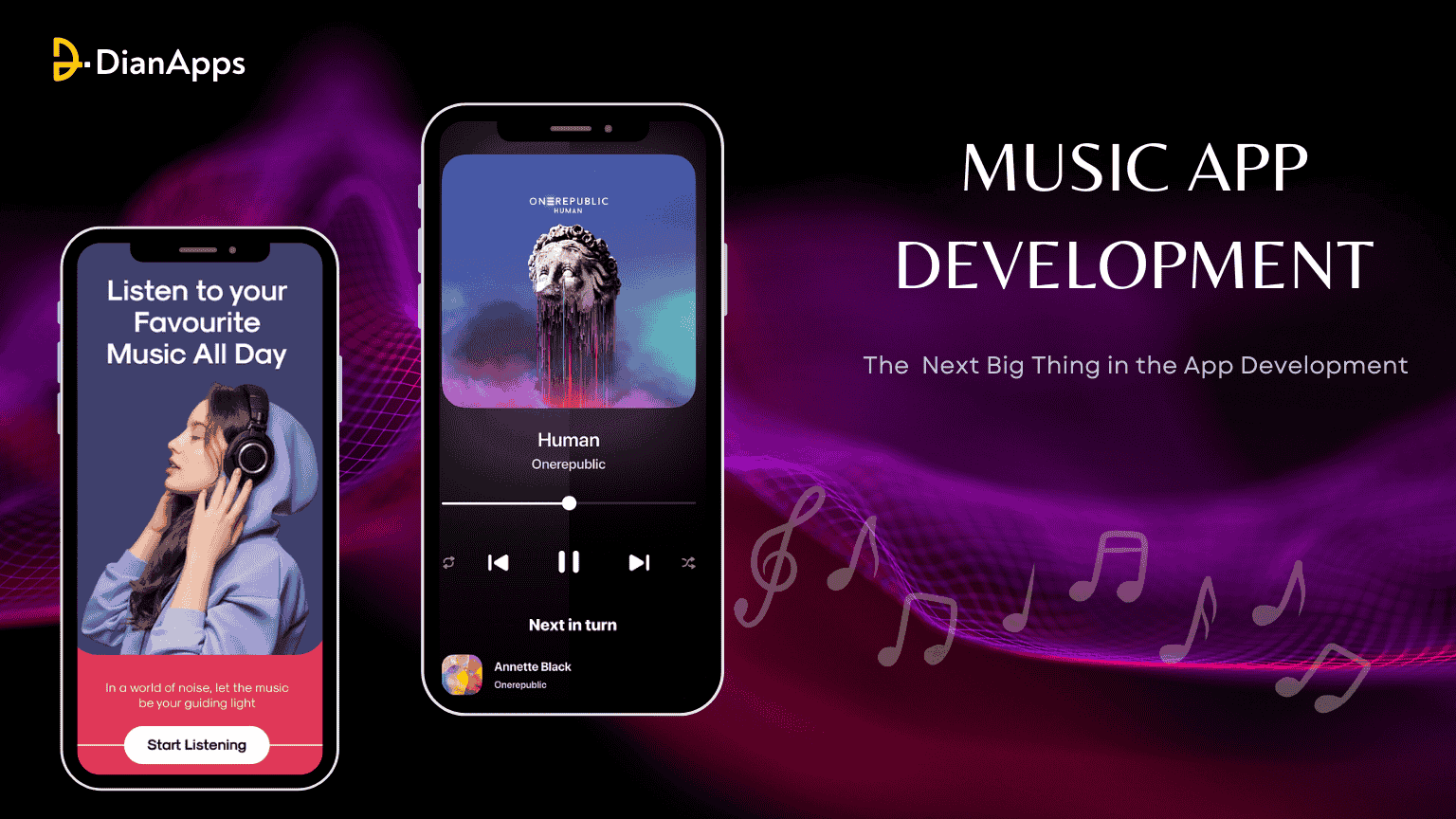It doesn’t matter if we are exercising, chilling, commuting, or just relaxing, we are in the habit of listening to music. Music apps is another segment of the entertainment industry that has gained more popularity than video streaming applications.
The innovation of music streaming apps has replaced the trend of radios, Walkmans, or even iPods. Now, a major issue in creating music streaming applications that can take the next big step has become difficult for users due to increasing competition.
There are many investors, entrepreneurs, and business owners who want to build music applications that can help them build a profit from this over-expanding and growing market. To build innovative music apps you are not only required to provide personalized music suggestions to the people, but it requires a lot more than that.
You should properly research your app idea, or you can take on-demand app development services from a well–known company like DianApps. In this blog, we will learn why music is considered the next big step in mobile app development.
Reasons for the Popularity of the Music Apps
Music have become an important part of our lives for many reasons. Continue reading to know why music streaming apps are gaining high popularity.
Easy Access to a Huge Library
Music streaming apps have gained popularity in the market due to their accessibility feature which provides easy access to millions of songs, albums, and playlists. Now, with music streaming apps your favorite song has just become a tap away from you.
Convenience and Flexibility
Now you can listen to your favorite music anytime and anywhere until you have a good internet connection. Through these apps downloaded songs are even accessible when you are offline. This anytime and anywhere convenience of music apps has made it popular among people.
Personalized Recommendations
Machine learning algorithms are used by streaming apps to provide personalized music and track recommendations to enhance your user’s experience. This feature keeps users engaged and allows them to continuously rely on these apps.
Cross-Platform Syncing
Users can start listening on one device and continue where they left off on another, due to convenient device sync offered by many music apps. For frequent travelers, this change is very exciting.
Social Integration
Music apps allow users to share their favorite playlists or songs with their friends. This feature enhances the social experience and interaction of the users. It also adds fun to the people.
High-Quality Audio
Improvements in the audio system allow users to enjoy the high-quality and clear sound of the music. This plays an important role as many music lovers look for apps that provide good audio quality.
Affordable Subscription Plans
Subscription of apps like Spotify is very affordable while some of the apps provide free access with ads. The quality of providing affordable ads-free music services has contributed to the huge success of mobile apps.
Market Overview of the Music Streaming Apps
Other than the factors mentioned above for the success of the music apps. Here, you will get to know about the important stats related to music apps:
- If we look at the average of the revenue generation it is $26 per person.
- More than 60 million Apple Music App Users are paying subscription costs to enjoy listening to music.
- Spotify has a user base of around 200 million subscribers, and among them, 109 million people are paid subscriptions who want to enjoy an ad-free music experience.
- According to the statistical report given by Statista, it has been assumed that in 2025 the music app market will grow at a rate of 5.4%.
Now you must have understood the power of mobile apps in the growing market of music apps. Continue reading to learn more about the essential features required for mobile app development.
Features Required for Music Apps

To ensure the success of the music apps, one needs to stay concerned about the features integrated into the application. The success of the app is highly dependent on its features.
User-Friendly Interface
The interface of the music app must be simple and easily understandable, so people can easily access their favorite songs and create a personalized playlist. So, while developing an application ensure to have a clear interface.
Playlist Creation
Another important reason for the high use of music streaming apps is its ability to store and manage a long list of music. This app also allows users to store and create a playlist based on their preferences, you can also share your playlists with your friends.
High-Quality Audio Streaming
Music streaming apps must provide a high-quality audio stream to the listeners even with low network access. The quality of the music plays an important role in the success and popularity of the application.
Search Options
Music Streaming apps must provide a search option, and it should be so advanced that it can search songs with the name of the artist. Moreover, it must provide preferences based on the listing preferences of the users.
Offline Listening
With the growing importance of music in the everyday lives of people, providing offline access to music is essential. Make sure to provide a feature through which people can access their favorite tracks and music offline. This feature increases the accessibility and user market of the apps.
AI-Based Music Recommendation
Integration of AI in the music app plays an important role in providing personalized experiences to the users. It also allows users to get personalized recommendations based on their preferences and their previous listening habits.
Read more to learn about developing an AI music app.
Different Types of Music Streaming Apps
Music streaming apps are of various types look further to learn about all the types of music streaming apps:
On-Demand Music Streaming Apps
On-demand music streaming applications, allow users to easily search for music, a playlist, or an artist whenever they want. Some of the popular examples of on-demand music streaming apps are Spotify, Apple Music, and Amazon Music. This app also allows you to save, download, and create playlists of your favorite songs.
Internet Radio Apps
Internet radio apps were highly popular in the earlier days when people used to listen to music curated by music channels. These apps are very similar to traditional radio but with the innovation of offering genre-specific stations and fewer ads. iHeartRadio is one popular app.
Music Library Apps
This app is quite different as it doesn’t provide a list of music, but on this app, you need to upload your favorite music to the cloud and stream them across multiple devices. Google Play Music is the best example of this application.
Live Concert Streaming Apps
The Live Concert app basically focuses on live streaming of the concerts and events on the app. This app allows users to feel that they are attending the live performance of their favorite artist without moving to another place. Some famous apps are Stageit and LiveXLive.
Podcast and Music Combo Apps
Some apps like Spotify provide access to both podcasts and music. Other than Spotify Audible also combines music streaming apps with podcasts and music both in one place.
Niche Music Streaming Apps
Some music apps primarily focus on a particular region or a category. For example, apps like SoundCloud allow users to search for independent artists and provide a complete playlist of them. Another such app is Idagio which focuses on classical music.
Music Discovery Apps
Music discovery apps as the name suggests its used for identifying new music and upcoming artists. These apps use AI features like music recognition, recommendation, and trending charts. A famous example is Shazam which works on recognising music.
Ad-Supported Free Streaming Apps
Many apps offer free ad-supported versions for those who choose not to pay a subscription. These apps are a fantastic choice for casual listeners, although they may have flaws like advertising or worse music.
Challenges Faced with Music App Development
There are various challenges that one needs to encounter while developing a music app. Listed below are some challenges faced while developing an application.
Music Licensing
Acquiring the correct music streaming licensing requires you to go through complete laws and regulations related to the music industry. Moreover, you are also required to deal with record label representatives, which can become a quite lengthy and expensive process.
Data Storage and Scalability Management
Music apps must have a strong and large storage capability to manage a large file of music and user data. Another major issue that is encountered by most music streaming apps is scalability features while maintaining the high-level quality of apps.
Cross-Platform Compatibility
Music apps must seamlessly work on different platforms and devices, it is essential to make it accessible to a large number of people. A music app created by you must seamlessly work on iOS, Android, Description, or on the Web. There are benefits of developing a cross-platform application.
Finding Experienced Music App Developers
One of the major challenges comes while searching for the best developers to create an innovative music application. However, it is impossible to build an application without the help of an experienced development team to build a music streaming application.
Audio Quality and Compression Balance
The most difficult technical issue is balancing between minimizing data consumption and providing top-quality audio streaming applications. It is difficult and time-consuming to find top audio quality without compromising on the stability of the playback within the music streaming apps.
Monetization Models for Music Apps
It is important to generate revenue through music apps while providing value to the users. Here is the list of the most common monetization models used by music apps:
Subscription-Based Model
One of the most common financing options is to charge monthly or annual user fees in exchange for premium features such as high-quality audio, online downloads, and ad-free music usage. This concept is crucial for consistent revenue generation in apps like Spotify, Apple Music, and Tidal.
Freemium Model
A small portion of the music, usually with a few ads, is available for free to users on a freemium business model. They have to upgrade to a payment plan to get the premium features. This approach encourages improving the best experience while appealing to many users.
Ad-Supported Model
In this model, users can stream music for free but must listen to or view advertisements between songs or on the app interface. Revenue is generated through partnerships with advertisers. Apps like Pandora and Spotify’s free version use this method effectively.
In-App Purchases
Through in-app payments, music streaming apps can offer services or other attractions, such as concert tickets, artist merchandise, or exclusive playlists. This improves the user experience and adds another source of revenue.
Pay-Per-Download Model
Some apps don’t offer subscriptions; Instead, users can purchase and download individual songs or albums. Platforms like iTunes have promoted the concept, which continues to attract customers who want a specific screen.
Affiliate Marketing and Partnerships
To generate revenue, apps can partner with other companies or businesses. For example, companies can use affiliate links to market speakers, headphones, and other music-related products in exchange for cut purchases.
Final Words
On a final note, the future of music apps looks bright and filled with potential. Here, you must have gone through the reasons for the popularity of music streaming apps, and understand why music streaming apps are going to be the next big thing in the mobile app development market.
Other than this we have also examined several challenges that need to be encountered while developing an application like hiring the right development team. Ensure to hiring of a leading mobile app development company to build innovative music streaming applications.










Leave a Comment
Your email address will not be published. Required fields are marked *